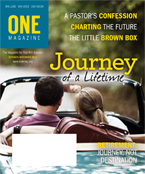
October-
November 2013
Journey of a Lifetime
------------------
|

Retirement: Journey, Not Destination
by John Brummitt
“Retirement is a journey, not a destination.” It is a catchy phrase. Short and simple; looks good on an exhibit at a convention. It conveys the thought that you don’t arrive at retirement and say, “I am done,” but rather “What else can I do?”
Retirement professionals stress how important it is to start saving for retirement as soon as possible, to save as much as possible. They throw out facts and figures that, while they have their place, just go in one ear and out the other, with little impact. True, you should be saving for retirement, but retirement income is only a small part of the equation. Retirement is not an extended vacation but a major, life-changing event.
My father has been a bi-vocational pastor since I was a toddler. Until I went to Welch College, I just assumed his full-time “job on the side” was the way most pastors carried out their ministries. Dad could hardly wait to “retire” into a full-time pastorate. Recently, he did retire from his “day job” and started living the good life. But he soon discovered he had been striving for a destination rather than preparing for a journey.
He looked at retirement as the end, only to learn he still had a long way to go. He quickly discovered that “retirement as vacation” was not reality. The “good life” he imagined turned out to be as challenging as his previous day job.
This idea that retirement is a permanent vacation frustrates many people after they actually retire. Vacations last a week, maybe two or three on rare occasions. What makes us think that retirement, which often lasts 20 years or longer, could possibly be the same?
Think about your last family vacation…how much planning you and your spouse did for that week. I’m sure you didn’t look at your spouse and blurt out, “Well, we need a vacation this summer, so let’s start saving money.” No, we research, plan, and pore over details, and that is for a single week. How much more should we plan for the years of retirement? We need to think beyond the destination to what we will do when we get there. If you spend months planning a week-long vacation, how much time do you need to plan for 20-plus years of retirement?
Tackle the Tough Questions
We all know the earlier we start saving the better. Money is definitely a part of what you need in retirement, and it is the easy part. The tougher questions come once we get there (or get close). Where will we live? What health challenges will we face? What will we do with our time? What will be our ministry? These questions are not easy, and they change constantly, but that doesn’t mean that you shouldn’t plan for them.
Your health will determine much of what you do in retirement. Take steps now to live a healthy lifestyle so you can enjoy the journey of retirement to the fullest.
Where we live in retirement often depends on what we can afford and where our families—especially grandchildren—live. If you are preparing to live close to your children, plan ahead for the cost of changing locations. If you plan to change locations, don’t expect to spend all your time with the grandkids. Your children and grandkids didn’t retire when you did; they will still be juggling busy schedules and careers. When you move closer, plan to get out, be active, and get involved in your new church and community. This will help you determine your retirement ministry and how you spend your time.
Establish a Game Plan
Have a game plan for retirement. Many people have a general idea of what they would like to do in retirement. My dad wanted to pastor full-time, but he didn’t plan for the details of the transition from bi-vocational to full-time ministry. Many people say, “I am going to fish and play more golf when I retire.” Fishing and golfing are fine, and you should enjoy your retirement. But after 40 years of working five or six days a week, a few weeks without a plan—without something to get up for—is all most retirees can handle.
The Christian retiree has the opportunity to be involved in full-time ministry. You may not pastor like my father, but you can volunteer at youth camps, help run Vacation Bible School, coordinate after-school Bible studies, and the list goes on and on from church to community. Retirees can be great kingdom workers because they are available, but you have to plan ahead in order to be used fully.
Vacations are great, and you will still need to plan them after you retire…if you prepare for your retirement. My dad is planning the rest of his journey now. Steps he should have taken while still working have caught up with him now. At some point in the future, he will probably retire again from his current pastoral position, but that is not where his ministry will end. He will face another transition period, but he will be prepared, with a game plan, when that time comes.
About the Writer: John Brummitt graduated in 2011 with an MBA from Tennessee Tech University. A 2004 graduate of Welch College, he has been with the Board of Retirement since the spring of 2006. |
|

